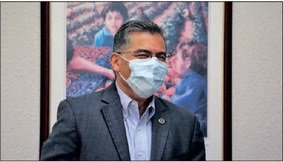BY DINA ARÉVALO THE MONITOR STAFF WRITER
MERCEDES — The high cost of health care hits especially hard in the Rio Grande Valley, a community with high incidences of diabetes and obesity and a higher-than-average number of uninsured patients.
That was the message local healthcare professionals and U.S. Rep. Vicente Gonzalez, D-McAllen, wanted to impress upon Xavier Becerra, secretary of the U.S. Department of Health and Human Services, as he took a tour of the region Thursday.
“We’re a safety net provider for a lot of the individuals that would not access care because they have no insurance,” explained Lucy Torres.
Torres serves as the CEO of Nuestra Clinica Del Valle Inc., which operates nearly a dozen medical clinics across Starr and Hidalgo counties.
Becerra traveled to the Valley from Washington D.C. at Gonzalez’s invitation to see firsthand some of the region’s most pressing healthcare concerns, including shortfalls in access to mental health care and the increasingly prohibitive costs of medications.
As part of their tour through the Mid-Valley, the pair made a stop at Nuestra Clinica’s Mercedes clinic.
As Torres explained, Nuestra Clinica strives to serve patients who would otherwise fall through the cracks — people without private insurance, but who do not qualify for Medicare or Medicaid.
U.S. Health and Human Services Secretary Xavier Becerra laughs as he talks during a meeting at Nuestra Clinic Del Valle on Thursday in Mercedes.
Joel Martinez | jmartinez@themonitor.com
The CEO explained that policy shifts, such as the advent of the Affordable Care Act in 2010, have done much to help bridge those coverage gaps, but more still needs to be done.
“About 35% of our patients are diabetic. And of course, you have another 10-15% that are pre-diabetic,” Torres explained.
Many patients are also considered obese, she said.
Combined, those two conditions put patients at higher risk of progressive health problems, such as kidney disease, issues that require more intensive — and more expensive — levels of care.
As a result, Nuestra Clinica works hard to educate its patients, stressing measures that can help stave off more serious conditions.
“We try to focus a lot on the preventive aspect,” Torres said.
The escalation of care is something David A. Garza, Precinct 3 commissioner for Cameron County, also touched on during Thursday’s roundtable with the secretary.
Garza, who has served on the commission for more than 20 years, has spent his entire career as a pharmacist in San Benito.
At the beginning of his career, a vial of insulin cost as much as $30, Garza said.
Today, that same vial costs almost 2,000% more.
“Now, that same vial is $380-400. (But) it doesn’t cost more to produce,” Garza said.
Through his pharmacy, Garza has seen how patients with limited means will attempt to ration their medications, to stretch the few dollars they have for as long as they can.
But doing so sets off a detrimental domino effect.
“What happens to that patient? They end up with eyesight problems. They end up hospitalized because of cardiovascular issues. They end up with hypertension. And they end up on dialysis — costing us as taxpayers an astronomical amount of money,” Garza said.
Adding to the problem is a bureaucratic morass that results in independent pharmacists like Garza losing money every time they fill an insulin prescription.
He gave an example of a pseudonymous Medicare patient who fills a three-month prescription for insulin, which retails for $2,062.
The pharmacy receives a $2,204 reimbursement, making a profit of $142.
At the end of the year, however, Medicare will claw back much of that money, if not more, Garza said.
“Come December, the end of the year, the DIR fees come in — and those are the fees that they charge us … for being part of their plan,” Garza said, referring to “direct and indirect remuneration” fees.
In essence, pharmacies are losing money when they fill certain prescriptions.
“Today, it’s costing me more than I get reimbursed for by the federal government. It absolutely makes no sense,” Garza said.
Becerra empathized with the county commissioner, saying it is “crucially important” for people to be able to afford their medications.
“We know that, for a lot of people, income and resources make it very difficult because these drugs can be very expensive,” the secretary said.
Becerra lauded Gonzalez and other members of the House who in March passed a bill that will cap the cost of insulin for patients covered by Medicare.
“Congressman Gonzalez and his colleagues who voted ‘yes’ on the Inflation Reduction Act, have made law the $35 a month cost for insulin for those on Medicare,” Becerra said.
That new maximum price will go into effect beginning next year.
However, the secretary also chastised Senate Republicans for restricting that price to Medicare patients only. Becerra said more work needs to be done.
Gonzalez agreed. “We’re the least insured state in the country and our population has double the uninsured as the rest of the state, so that’s a problem,” Gonzalez said.
“And I think it’s important that people at the very top of the administration have knowledge of this… and can make decisions to help improve our region.”
